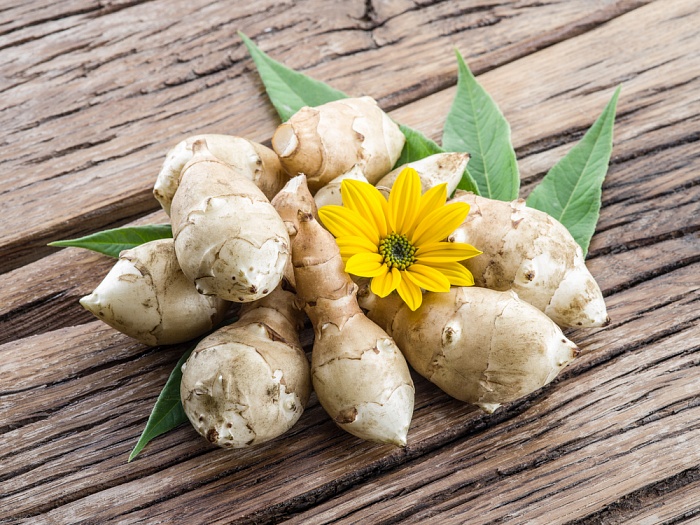Technologies and methods for storing Jerusalem artichoke tubers
17.06.2021 | Jerusalem artichoke
Jerusalem artichoke (earthen pear or Jerusalem artichoke) is a perennial herb about one and a half meters high, belongs to the genus of sunflower. It is cultivated as a valuable fodder, industrial and food plant.
The most valuable thing is not yellow flowers that look like sunflowers, but Jerusalem artichoke tubers that look like potatoes. They are not only edible, but also rich in nutrients, especially inulin. Inulin is actively involved in the pharmaceutical and food industries.
Everyone knows the truth: it is important not only to grow the crop, but also to preserve it. In order to preserve all the essential usefulness of tubers and provide the end consumer with high-quality and juicy products for the whole year, it is necessary to choose and observe the storage technology correctly.
The complexity of storing Jerusalem artichoke lies in its low keeping quality: the tubers have a very thin skin, and there is practically no subcrustal layer. If they are not cooled immediately after collection, then this will cause a significant loss of beneficial trace elements and substances.
Technologies and methods for storing Jerusalem artichoke tubers
Each method of storing Jerusalem artichoke has its own characteristics.
Storing Jerusalem artichoke tubers in the field is an acceptable option in areas where low soil temperatures prevail throughout the winter, but the soil does not freeze. With this method, the tubers remain in the soil and are harvested as needed. It is important to remember that Jerusalem artichoke does not like heat and sun - direct sunlight will destroy the tubers.
The autumn harvest of Jerusalem artichoke is usually stored in containers, boxes or bags in storage facilities or in ground piles 3m x 1.8m x 1m, provided with gutters. If the average daily temperature drops to -10 ° C, then the pile should be covered with peat / soil / straw.
Storage technology in trenches assumes loading with a layer of no more than 1.5 m and the use of supply and exhaust ventilation. It is important to prevent self-heating of stored tubers, as this entails instant spoilage.
For long-term storage in a vegetable store, dry, preferably clean (no more than 10% of the land in the total mass) tubers are used. Care must be taken not to get sick or mechanically damaged tubers. After collection, they should not be outside the store for more than a week if the air temperature during this period is above 15 ° C.
Lifehack for extending the shelf life of Jerusalem artichoke is the application of easily removable non-toxic paraffin coatings to the tubers, which contribute to long-term preservation and attractive presentation.
Also, tubers are stored in polyethylene bags with a length of 45cm to 62cm and a width of 15cm. In this case, the tubers are washed, dried, laid in 3 rows, the bag is hermetically sealed and laid in rows along the length and width of a standard box and placed in a storage with a temperature of 2 ° C.
Jerusalem artichoke tubers can also be stored in refrigerators and in general storages for up to a year at temperatures from 0 ° C to 2 ° C and relative humidity no higher than 95%.
Depending on the storage method, the total weight loss ranges from 19 to 91%. The largest total losses during storage are found in vegetable boxes, the smallest - during storage in polyethylene bags. The greatest natural weight loss - 42.7% - was observed during storage in vegetable boxes. The largest number of sick and wilted tubers when stored in containers in bulk 35%. The largest number of sprouted tubers is formed during storage in plastic bags - 5%. Storage in polyethylene bags ensures minimal indicators of natural weight loss, diseased and wilted tubers.
The least labor-intensive is storage of Jerusalem artichoke in bulk containers with polyethylene liners. This minimizes the use of manual labor and increases the utilization rate of storage volumes.
If the shelf life does not exceed 3 months, then the best way is storage in unsealed plastic bags at a temperature of 0-5 ° C. If the shelf life is about 5 months, then the best choice is storage in a modified atmosphere, since the metabolism of stored tubers slows down. The respiration rate of fruits decreases 4 times, therefore, the output of marketable products increases 3 times; the inulin content is one and a half times.
Careful sorting of tubers, correct and careful laying in the vegetable store, careful, systematic monitoring of the condition of tubers during storage - all this ensures the best preservation of Jerusalem artichoke.
Looking for a vegetable store? Or are you looking for equipment for long-term storage of Jerusalem artichoke? Our experts will answer all your questions. Call +74952293903 or write info@agrovent.com

